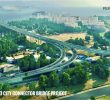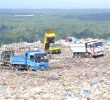Kyoto, Japan: Greenpeace today called on the Asian Development
Bank (ADB) to support an emergency response equal to the severity of climate
change impacts (1). Only by putting all its resources and expertise behind an
energy revolution based on renewable energy and energy efficiency can the Bank
remain relevant. �The ADB must shift now to supporting real solutions �
renewable energy and energy efficiency. Failure to do so spells disaster for
Asia�s most vulnerable. The next decade is decisive and coal or nuclear are
expensive and dangerous and have no role to play in the emergency response to
climate change needed. To say that coal can be part of a sustainable energy
future is like saying that cancer can be part of a healthy body�, argued Gerd
Leipold, Greenpeace International Executive Director.
The majority of the Asian Development Bank�s funding comes from industrialised
countries such as Japan, the US and the EU. �It is these countries which have
caused an overwhelming part of the climate crisis. It is their responsibility
now to share and support the expansion of real solutions such as wind and solar.
The developed world can�t at the same time ask India and China to do more to
protect the climate while it funds coal plants in India through the ADB,�
continued Leipold. The emissions of two plants the ADB approved in 2006 will be
15 times more than Laos and Cambodia combined, two of the most vulnerable ADB
members (2).
Asia is key to global climate protection and an urgent switch in the way it uses
and produces energy is paramount. Globally, a sustainable energy revolution
requires US$300 billion per year, about the same amount the fossil fuel industry
currently receives in subsidies (3). In Asia, US $60 billion a year will be
needed.
�Real climate protection requires real funding. Greenpeace believes the ADB must
take the lead in this effort or risk irrelevance. With renewables and
efficiency, Asia can have both economic development and climate protection. The
window for action is closing fast but it is not too late. Kyoto was the
birthplace of the first global climate treaty. Kyoto 2007 must be remembered as
the start of Asia�s energy revolution�, said Athena Ballesteros, Greenpeace
International Asia regional climate campaigner.
�The ADB must quit coal and make renewable energy its main business. Funding
outdated and unproven coal technologies will leave a dangerous and deadly legacy
for future generations. Doing so in Kyoto would be a disgrace� concluded
Leipold.
Notes to Editors:
(1) IPCC
(2) The 2,980 MW Sipat Super Thermal Power Project and the 1,500 MW
Kahalgaon
Super Thermal Power Project Stage II extension were approved in 2006
(http://www.adb.org/Projects/project.asp?id=39916). The total CO2 emission of
the two power plants is 37.6 million tons per year (using coal�s carbon emission
factor of 0.98 kilograms/kilowatt-hour). The combined CO2 emissions of Cambodia
and Laos is 1.9 million tons, see cait.wri.org
(3) http://www.energyblueprint.info/447.0.html
Contacts:
Athena Ballesteros, Greenpeace International Asia regional climate campaigner,
(m) in Kyoto + 81 (0) 90 21407119, Philippines (m) +63-917-8131562
Martin Baker, Greenpeace International communications coordinator, (m) in Kyoto
+81 80 15097161
Martin Baker
Greenpeace International Communications Coordinator (Asia)
c/o Greenpeace China
3/F Seaview Commercial Building,
21 – 24 Connaught Rd. West,
Sheung Wan, Hong Kong, CHINA
(w) +852 2854 8383
(m) +852 9014 5259
(fax) +852 2745 2426
In Kyoto +81 801509 7161
Tell the Asian Development Bank to stop funding climate change and to start
funding the solution, renewable energy:
http://www.greenpeace.org/seasia/en/campaigns/climate-change/asian-development-
bank
****** INBOX is an archive of press releases, statements, announcements, letters to the editors, and manifestos sent to Davao Today for publication. Please email your materials to davaotoday@gmail.com. Davao Today reserves the right to edit or refuse material for publication. *****









